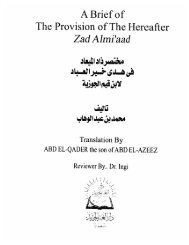You also want an ePaper? Increase the reach of your titles
YUMPU automatically turns print PDFs into web optimized ePapers that Google loves.
The Day of ‘Arafah [The 9 th day of Dhul-Hijjah, standing at ‘Arafah<br />
on the 9 th of Dhul-Hijjah and staying there from mid-day to sunset is<br />
the essence of the <strong>Hajj</strong>]<br />
The Day of Nahr [The 10 th day of the Dhul-Hijjah on which pilgrims<br />
slaughter their sacrifices]<br />
Days of Tashreeq [The 11 th , 12 th , and 13 th days of the month of Dhul-<br />
Hijjah. On these days, the pilgrim throws pebbles at the stone pillars,<br />
a ritual known as Rammy, in Minâ]<br />
Dhikr [Remembrance of <strong>Al</strong>lah through verbal or mental repetition<br />
of His Divine Attributes or various religious formulas, such as ‘Subhân<br />
<strong>Al</strong>lah,’ meaning ‘<strong>Al</strong>l Glory be to <strong>Al</strong>lah’]<br />
Eidul-Adhâ [A four-day festival that completes the rites of<br />
pilgrimage and takes place on the 10th-13th of DhuI Hijjah (the 10th<br />
is the day of Nahr and 11th-13th are the days of Tashriq). Literally<br />
means ‘the feast of the sacrifice.’ This feast commemorates the<br />
Prophet Ibrahim's obedience to <strong>Al</strong>lah by being prepared to<br />
sacrifice his only son Ismâ‘îl, peace be on both of them]<br />
Farewell <strong>Hajj</strong> [The first and the last <strong>Hajj</strong> performed by the Prophet,<br />
may <strong>Al</strong>lah bless him and grant him peace]<br />
Hady [An animal (a camel, a cow, a sheep or a goat) offered as a<br />
sacrifice by the pilgrims]<br />
<strong>Al</strong>-Hajarul-Aswad (The Black Stone) [A stone from Paradise. It was<br />
set into one corner of the Ka‘bah in Mecca by Prophet Ibrâhîm<br />
(peace be upon him). The Black Stone was personally installed in<br />
the wall of the Ka`bah by the Prophet Muhammad (peace and<br />
blessings be upon him) himself during its reconstruction following its<br />
destruction by a flash flood. The Prophet (peace and blessings be<br />
upon him) also kissed it during his Farewell <strong>Hajj</strong>. Thus, touching and<br />
kissing <strong>Al</strong>-Hajarul-Aswad during ‘Umrah and <strong>Hajj</strong> is considered<br />
Sunnah and an act of obedience. Muslims do not worship the Black<br />
www.islambasics.com 110


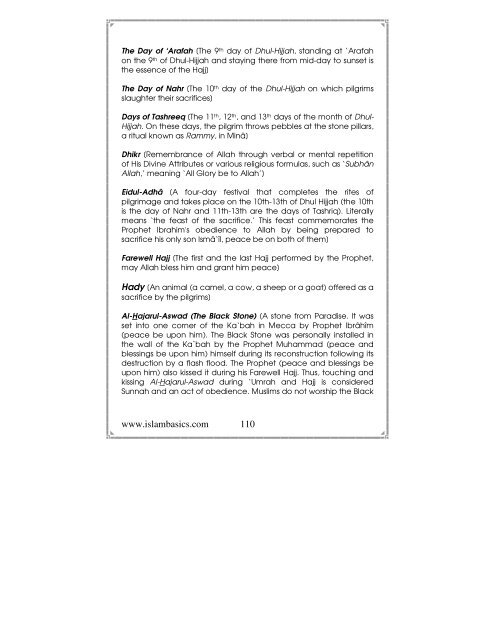

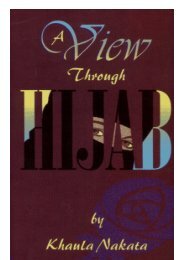
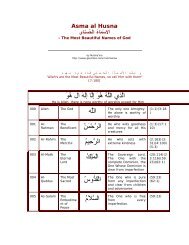
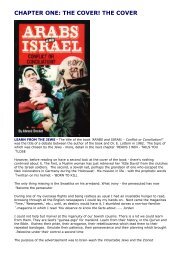
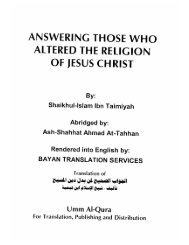


![Al-Quran - The Miracle of Miracles [ deedat]](https://img.yumpu.com/4137688/1/190x245/al-quran-the-miracle-of-miracles-deedat.jpg?quality=85)
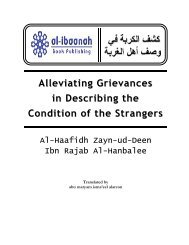
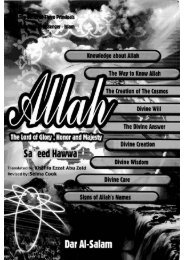
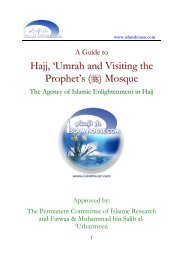
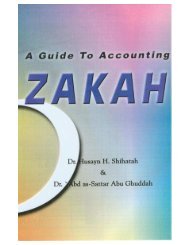
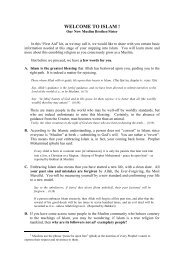
![A Collection Of Wise Sayings [ Al-Fawaid ].pdf](https://img.yumpu.com/4135801/1/190x245/a-collection-of-wise-sayings-al-fawaid-pdf.jpg?quality=85)
